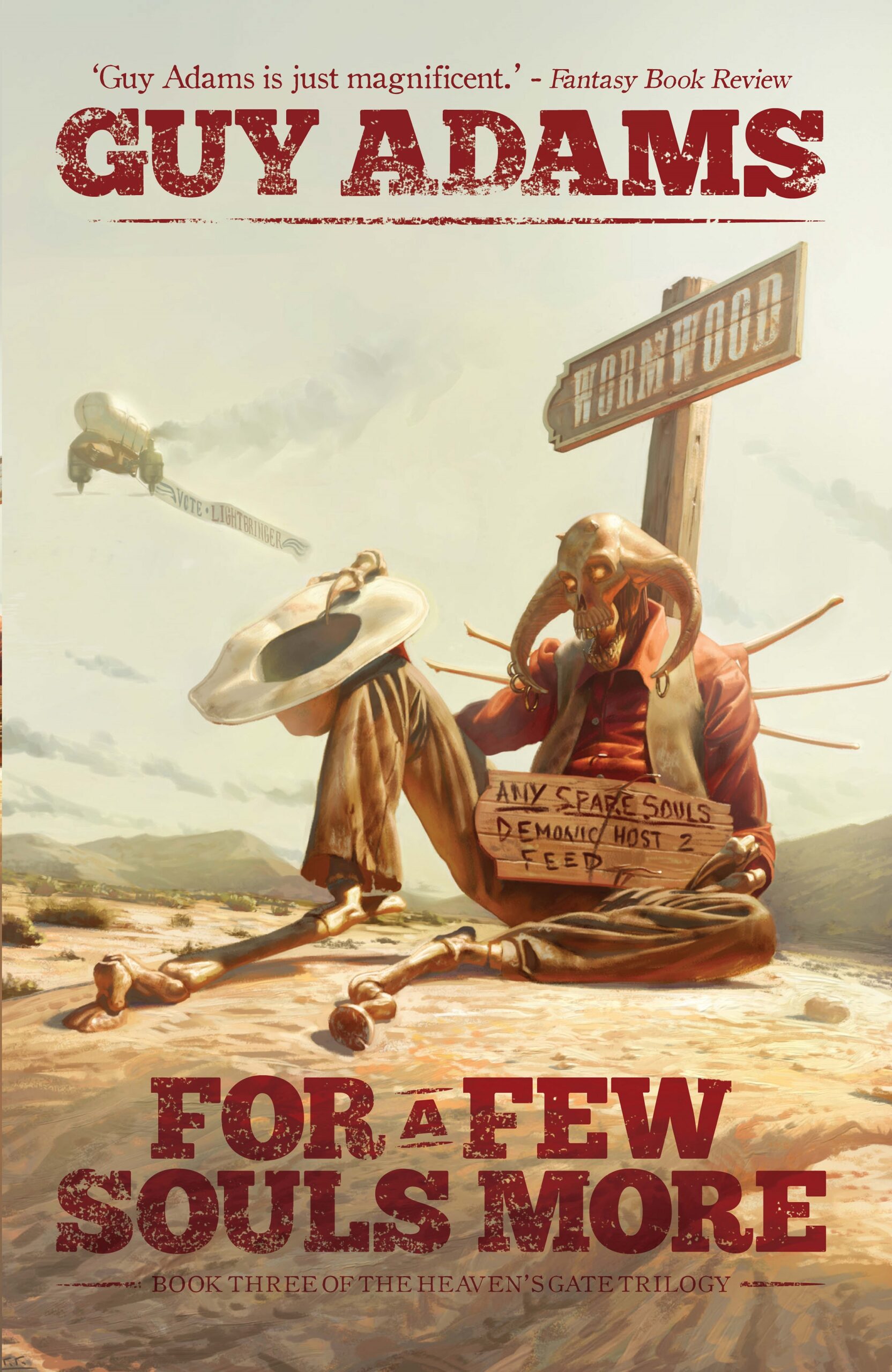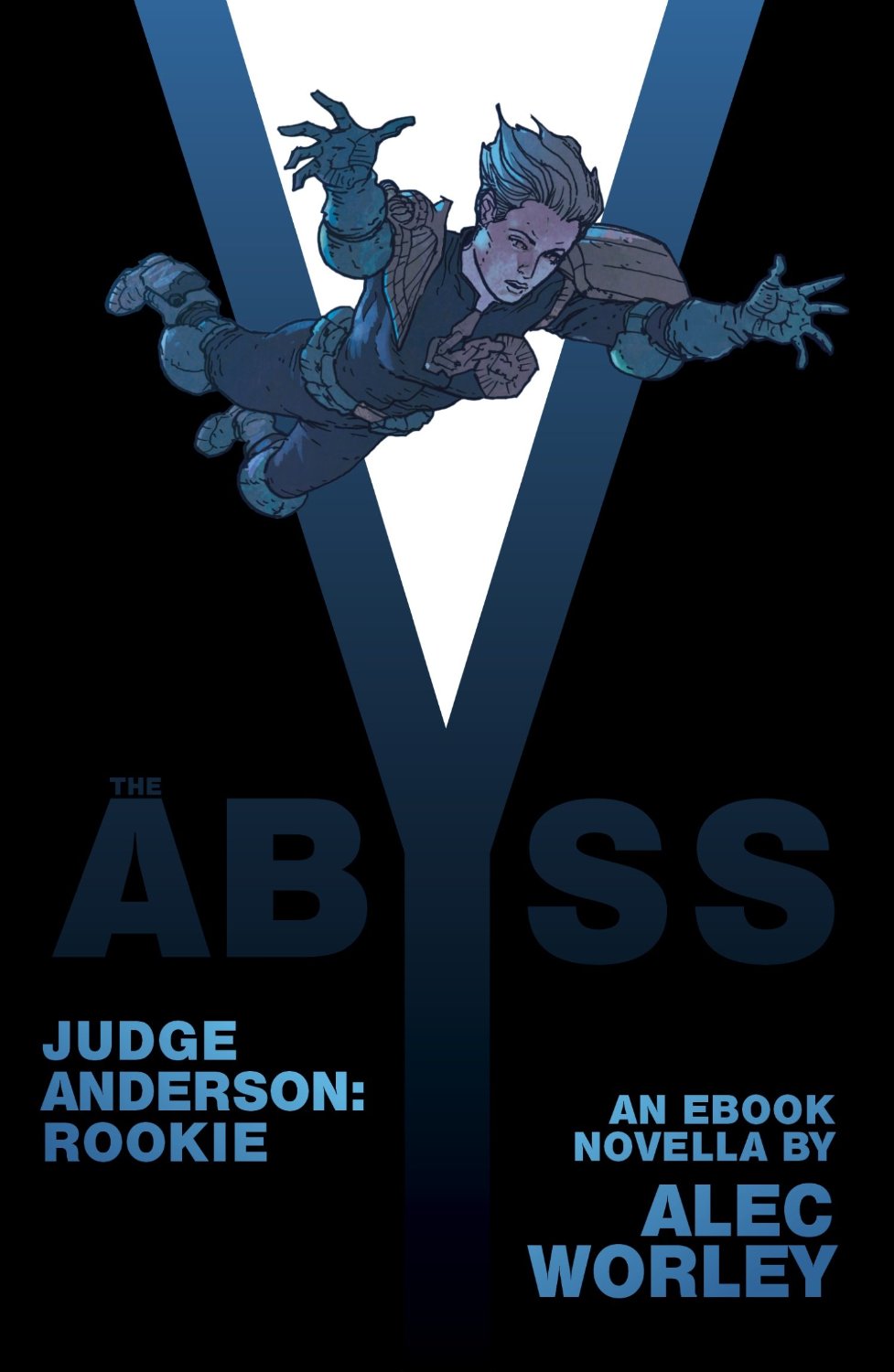
Guy Adams: writing across mediums
With the final title in the Heaven’s Gate trilogy For a Few Souls More out last month and the new comic series Ulysses Sweet for 2000 AD coming to its conclusion shortly, we asked Guy Adams to open up behind the differences between writing for comics vs novels. Below is his response.
PAGE 1
PANEL 1
A writer’s office, all the usual: unread classy books, well-thumbed trash novels, a marked absence of pens and a surfeit of cats. GUY ADAMS is sat at his desk but turned to look directly at us. He is a devilishly handsome man in that ‘impaled himself on the nozzle of a cavity wall insulation pipe then fell in a pit of angry ducks’ kind of way.
GUY
So, they’ve asked me to explain the difference between writing comics and novels.
PANEL 2
GUY
looks off panel, scratching his face in the way he does when he’s having a vigorous think.
PANEL 3
He turns back to us.
GUY
I guess we’re taking as read the whole ‘nobody comes along and draws my novels making them look much better’ thing?
PANEL 4
GUY is now an absolute Adonis of a man. Just looking at him makes your reproductive organs clatter like football rattles.
GUY
I mean, with a good artist a writer will always appear better than he actually is.
PANEL 5
GUY is returned to his normal self.
GUY
That aside, to begin with, there’s no difference at all… The gestation is the same. Lots of dedicated research and notes.
PAGE 2
(The following is a six panel grid, a montage of desk bound images. Keep the same angle, it should look like time-lapse photography, a fixed camera charting the calcification of an author.)
PANEL 1
GUY sat up straight, this man means business, a blank page is open on the computer screen in front of him.
PANEL 2
GUY is slumping slightly, screen still blank. Out of boredom, he pokes at a passing cat.
PANEL 3
GUY is slumped further, now on Facebook looking at all the other writers who aren’t working either.
PANEL 4
GUY is virtually horizontal. His partner has entered. She is looking despairingly at him.
DEBRA
I thought you were working?
GUY
I am.
PANEL 5
Same as above but no dialogue. A beat.
PANEL 6
Same as above but now GUY speaks.
GUY
I’M THINKING. GO AWAY!!!
PAGE 3
PANEL 1
Back to the set up from page one, GUY talking to us, he’s tapping at his temple.
GUY
It’s all about the ideas. Once you have them you decide what medium they’d work better in.
PANEL 2
A close-up of some text on GUY’s computer screen.
CAPTION
Because each medium has it’s own strengths.
TEXT
On the plains of Balthazar, just north of that viscous and unpleasant place known locally as the Bristle, a lone rider made his way towards the city of Golgotha.
The Choir of the Heat watched him as he passed, their cracked and dusty eyes grinding in their sockets as he crossed the horizon, trailing a dissipating tail of red earth behind him. As always, they sang their opinion on the matter, the birds in the sky above them circling away from the advances of those sharp and lethal notes. The rider, pre-warned, had taken his own precautions, his ears clogged shut with mud from the banks of the Bristle. It fizzed and popped, filling his head with a sound like cradles burning.
CAPTION
Now. The above scene is certainly visual and could work as a page of comics but you’d think long and hard about throwing that many words at a comic. It certainly wouldn’t fit in a panel like this pretend script suggests it can. In a novel it’s a third of a page of scene setting, something you can throw out there knowing you have all the space in the world. Words are cheap in prose. In a comic, space is everything. Just look at this caption, it’s madness, words, words, words, words, words… A lot of prose writers who try their hands at comics end up trying to use too many words. I certainly did, both on THE ENGINE scripts for Madefire and the first series of ULYSSES SWEET: MANIAC FOR HIRE for 2000AD (but more on that nut job in a bit). There’s also the notion of invisible notes of music being able to cut passers-by, that strikes me as something that’s inherently suited to prose because it’s a concept that works better in the imagination than as a physical image. How do you draw invisible, killer notes?
PANEL 3
GUY is holding up a copy of FOR A FEW SOULS MORE.
GUY
That prose passage is from my latest novel by the way. One of the reasons I’ve been asked to write this piece. So, you know…
PANEL 4
GUY now fills the panel as if he’s trying to burst out and grab the reader. His face pressing against the flat, two-dimensional plane as if slammed against a pane of glass.
GUY
AT LEAST PRETEND YOU MIGHT CONSIDER BUYING IT YOU FREELOADING, INTERNET SCOURING BASTARDS!
PANEL 5
GUY is now returned to the same calm pose as Panel 3. The book in his lap.
GUY
Whereas the above is a very comic-based trick. The rhythmic equivalent of a jump cut, used to punch home a point for comedic or dramatic effect. You couldn’t do that in a novel.
PANEL 6
GUY is throwing the book over his shoulder.
GUY
The whole ‘pretending a character collides with the physical structure of the comic’ thing is a bit of theme for me. I use it in ULYSSES SWEET.
CAPTION
But more on that nut job later.
PAGE 4
PANEL 1
Big, explosive panel, the desk is ablaze, another passing cat gazes out at the reader in shock. GUY has pulled off his face to reveal he was Neil Gaiman all along.
GUY
Comics also offer that ‘page turn’ moment when you can suddenly spring something on a reader. Because of their visual nature they can have a more immediate impact. A line of prose takes a moment to sink in.
PANEL 2
The office is now extinguished, everything looking black and wilted. GUY too is miserable, hunched and dejected.
GUY
Though it works best in digital where the reader is less inclined to flick through the whole thing, spotting your big reveals before you want them to.
PANEL 3
The office, and GUY, now returned to normal. Once more addressing the reader ‘straight’.
GUY
Immediacy and structure. That’s a big deal with comics. Time yourself, ensure the pages turn at the right dramatic moments, the big, action panels have space to breathe. Don’t write too cluttered (like this bit of dialogue) but nor should you script a page too short so your artist has to fill in on your behalf.
PANEL 4
A big picture of a bowl of fruit because GUY didn’t script enough panels for this page.
PAGE 5
PANEL 1
A silhouetted figure, a big question mark at its heart.
CAPTION
Of course, the visual nature of comics can also be a drawback. In prose you can hide things in plain sight. Surprising the reader with the identity of a character or a plot twist. When the reader only sees what you allow them to, you can pull the rug from underneath them easily.
PANEL 2
A reader fallen over, flat on his back, a copy of FOR A FEW SOULS MORE covering his face. GUY is holding the edge of a rug in his hands, looking down at the poor fool who has just spent money on his story.
GUY
There’s an insidiousness to prose, it creeps, it misleads, it plays games with the reader. Just ask Roger Ackroyd.
PANEL 3
GUY is stood with his arm around ULYSSES SWEET.
GUY
Another issue with comics is one of ownership. This is my good friend Ulysses Sweet.
ULYSSES
Get your hand of me or I’ll hollow it out and use it as a swiss-army condom.
PANEL 4
GUY no longer has his arm around ULYSSES, instead he is gesturing towards the right, a showman’s pose, welcoming GRANT MORRISON and JOHNNY JOHNSTONE into the panel. They look awkward to be there.
GUY
Now, I didn’t create Ulysses. He was invented by these men here.
PANEL 5
GUY now has his arms around GRANT and JOHNNY.
GUY
Ulysses was a character in a four page story by these two, appearing once more in another two part tale, this time drawn by Colin MacNeil. But they left me a lot of room to move, I was able to re-invent him a fair bit, create a supporting cast, a world for him to inhabit…
PAGE 6
PANEL 1
GUY is now surrounded by other characters he’s worked on: ULYSSES is back, as is ROGUE TROOPER and MAX NORMAL.
GUY
Some writers find the idea of working with characters they didn’t create difficult. Personally, I think it’s great fun to take them over for a little while, bring something new to them and have a little fun.
PANEL 2
ROGUE turns to stare at GUY in disgust. GUY’s grin remains fixed.
ROGUE
Fun? You’ve blown me up, poisoned me with a killer virus, set killer zombies on me… You’re psychotic.
PANEL 3
MAX looks at ROGUE. GUY’s grin is now beginning to look a little forced.
MAX
Baby Blue, bully for you! The dude set a killer robot on me. My creases had creases, my favourite tailor died just clocking me.
PANEL 4
ULYSSES joins in, his face is happy. Happier than GUY who is really starting to look uncomfortable behind his crazy grin.
ULYSSES
He had a guy punch out my spine. Boom. Lungs ended up swinging between my legs.
PANEL 5
Both MAX and ROGUE are staring at GUY in despair. GUY is now crying. ULYSSES is smiling, peaceful and content.
ULYSSES
I enjoyed it. Pussies.
PANEL 6
MAX and ROGUE have vanished leaving little puffs of smoke. GUY is now alone with ULYSSES.
GUY
Luckily, as the writer, you have ultimate control. If characters start misbehaving…
ULYSSES
Kill ’em in the sort of cool ways that really make the Internet sing.
PAGE 7
PANEL 1
GUY still stood with ULYSSES.
GUY
Of course, none of this is set in stone. For the most part I’m talking about cheap tricks, surface pleasures, the art of writing can’t be so easily explained.
PANEL 2
GUY is enthused by his subject, ULYSSES is yawning.
GUY
No rules are set in stone, in any medium. You do what you want, you challenge the perceived limits, you make NEW rules.
PANEL 3
GUY looks like a preacher now, arms wide in ecstasy at his own pompousness. ULYSSES has his head in his hands.
GUY
The art of creation has no limits! When you’re the writer you’re God! The world bends to your will! Let nobody tell you what you should do! Ignore all advice! Nothing can stop you!
PANEL 4
ULYSSES has pulled out his gun and shoots GUY in the head, a spray of hot plasma and grey matter.
PANEL 5
ULYSSES holding up a copy of 2000 AD
ULYSSES
New series. Sexy death and overblown jokes. Buy it or I’ll pull you apart with my toenails.

